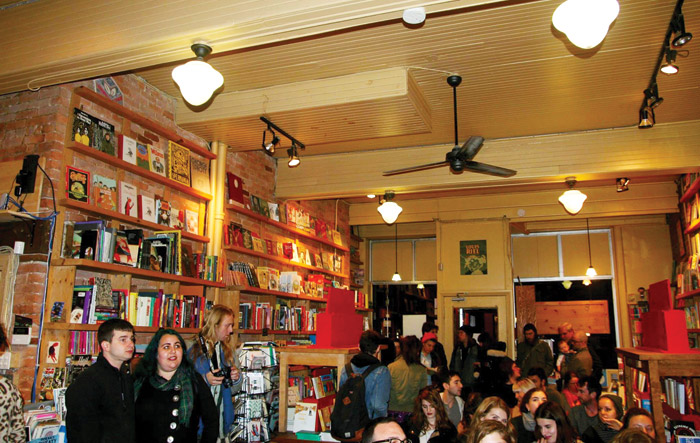Librarie Drawn and Quarterly, a snug little bookstore in the Plateau, welcomed four American writers—Mira Gonzalez, Elizabeth Ellen, Chloe Caldwell, and Chelsea Marti—to present their monotone yet dynamically comic collections in spoken word. The synergetic flow between the four writers is astounding, yet makes perfect sense. All four women write poetry, novellas, short stories, and everything in between. It was hard not to enjoy yourself in the laid-back atmosphere of the bookstore, despite how packed the venue was. However, the content of the writing could be a turn off for some. It is painfully truthful, and sometimes feels a bit like a list of ‘first-world problems.’ Each woman forcefully imposes her deepest, most taboo and dark secrets on us, inciting a sense of proximity and accessibility rarely achieved even with our closest confidants.
Author Guillaume Morissette hosted the event with charming sincerity, introducing the authors with a selection of their tweets—which are, in fact, an integral volume of their writing. Unrestrained laughter ensued. Coming to the stand first, in a Teenage Mutant Ninja Turtle costume, was Ellen. Her poetry is resistant to sending an email, to unconstrained loving, and to life. The sheer honesty and truthfulness of it is shocking—it puts a mirror up to your face, and forces you to look at the harsh reality of your existence. While it is powerful, it is somewhat unrelatable. These are specifically western middle class issues, and while this does not detract from the poetry’s poignancy and value, it does narrow its scope.
Next, Caldwell presented a chapter from her novella entitled Women (2014), which delves into a relationship between a married woman and her much younger mistress. This tumultuous relationship is presented in a factual and even conversational tone. Caldwell states that she “breaks all the Creative 101 rules, which [includes] Show, don’t tell.” Breaking through the boundaries of normative styles of writing, this narrative follows in the steps of the Italian Neorealists in its grit and realism. It’s a dark and somewhat pessimistic view. The poetry explodes into the new world of the internet, with online dating and new paradigms of thinking about gender identity, while always harking back to the age old quest for happiness.
Martin followed Caldwell with an anti-poetic series of internal struggles, titled Even Though I Don’t Miss You (2013). The words form an oxymoron of the un-poetically poetic, and seemingly massive yet minuscule events in her life—like eating a pizza pocket completely frozen. The apathy with which she presents these events makes it strangely relatable and hilarious.
Gonzalez was up next, and continued this unrelenting lack of desire for change. Her writing, entitled I Will Never Be Beautiful Enough to Make us Beautiful Together speaks to a generation living in a daze of technological immersion, losing touch with the vivacity of living in the moment. Her writing, and speech is a self-deprecating parody of ‘now.’
All of the works presented expressed the reality of an individual—significant in their specificity and the compassion they trigger. While this post-modern millennial generation of writers is distinct and fresh, their writing is not universal. Entering their realm, we need to break free of conservative shackles, and come ready to unfasten our preconceptions about writing and its grand aspirations.








